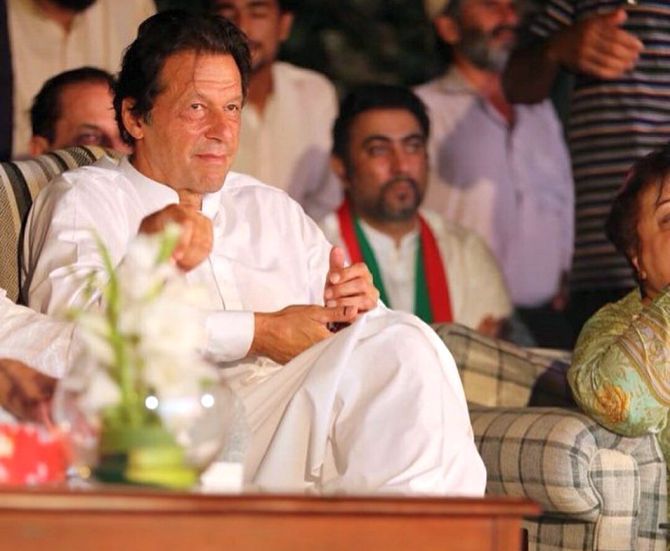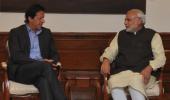'The US appears to think that Pakistan is highly vulnerable today due to its economic crisis and one more turn of the screw may bring about desired results,' says Ambassador M K Bhadrakumar.

The surprise element in the Pentagon disclosure that a final decision has been taken on their July move to suspend $300 million military aid to Pakistan is that it came when there is just a couple of days left for US Secretary of State Mike Pompeo's arrival in Islamabad.
If nothing else, courtesy demands that the disclosure was kept pending till the upcoming talks got over.
The diplomatic snub comes within days of the fracas over the transcript of a phone conversation recently between Pompeo and Prime Minister Imran Khan.
Call it 'psywar'; or, call it forewarning of shape of things to come; or, call it a cool assessment in Washington that a strategy of 'maximum pressure' might still work to push Pakistan to change its policy on the Afghan war.
At any rate, this does not exactly make a good curtain raiser for the conversation in Islamabad on Tuesday when Imran receives Pompeo or when the latter accompanied by the chairman, US joint chiefs of staff General Joseph Dunford, calls on Pakistani army chief General Qamar Bajwa.
The bottom line is that the US appears to think that Pakistan is highly vulnerable today due to its economic crisis and one more turn of the screw may bring about desired results.
On the other hand, Pakistan too thinks that the US is at its most vulnerable point in the 17-year old Afghan war -- indeed, more and more Pakistani analysts are drawing the analogy of the Vietnam War.
All this puts a damper on the facile assumption of Pakistani commentators that this is a time of hope and Pompeo's visit may pave the way for a smooth approval of a multi-billion dollar IMF bailout for Pakistani economy, which is of the highest importance for the Imran Khan government.
Clearly, continuing tensions in the relations with the US could greatly complicate the terms of any IMF bailout package.
Will China loosen its purse strings and assume responsibility for redressing Pakistan's acute balance of payments situation?
It is a tantalising possibility, but then Pakistan is a much bigger country than Sri Lanka. Chinese State Councilor and Foreign Minister Wang Yi is visiting Islamabad this week no sooner than Pompeo departs.
Of course, the CPEC can be 'tweaked' to dovetail with Imran's development agenda. This is one way China can help.
In the given situation, though, Pakistan would expect China to give generous financial support, too.
To be sure, the importance of Pakistan's stability has never been so high as today in the Chinese regional and global strategies.
Which means that Pakistan may still have some wriggle room left and Washington may be underestimating Islamabad's tenacity to withstand American pressure.
Having said that, Pakistan's own preference will still be to approach the IMF for a bailout, since it will also open the door to Western investments and capital.
Thus, the outcome of Pompeo's visit isn't necessarily a foregone conclusion.
Therefore, the scheduling of Iranian Foreign Minister Javad Zarif's visit just before Pompeo's visit and the resounding support Pakistan has expressed for Tehran in its faceoff with the Trump administration over the 2015 nuclear deal wasn't probably a smart thing to have done -- by provoking the Trump administration at a sensitive juncture when it barely coping with its Iran strategy.
(This might even have triggered the knee-jerk reaction in Washington on the cancellation of the US$300 million military aid.)
On its part, Tehran has been pinning high hopes on a fundamental shift in the Pakistani calculus under Imran's leadership, who is seen as different from the country's traditional ruling elite.
But so far the 'feel-good' has been confined to nice words and atmospheric.
A sure sign would have been Pakistan's willingness to move forward on the Iran gas pipeline project. But that didn't happen.
All that was agreed was an understanding to hold the next rounds of bilateral political consultations and the joint economic commission at early dates. It remains unclear whether Imran will attend the 3rd Asian Cooperation Dialogue summit in Tehran in October.
Nonetheless, Zarif appears to have had a good meeting with Imran. Warm words were exchanged. However, there are serious limits to economic cooperation between Iran and Pakistan at this point in time.
Both countries are facing a serious cash crunch. And it is improbable that the Pakistani elite will risk US sanctions.
From the Indian perspective, How does it all add up? Simply put, the tempo of US-Pakistani tensions should not affect our forthcoming contacts with the Imran government.
Nor is there is any reason why US-Pakistan tensions should cast shadow on the 'few ongoing efforts' -- to borrow the expression of the Pakistani spokesman -- under way currently, presumably below the parapet, to improve India-Pakistan relations.









